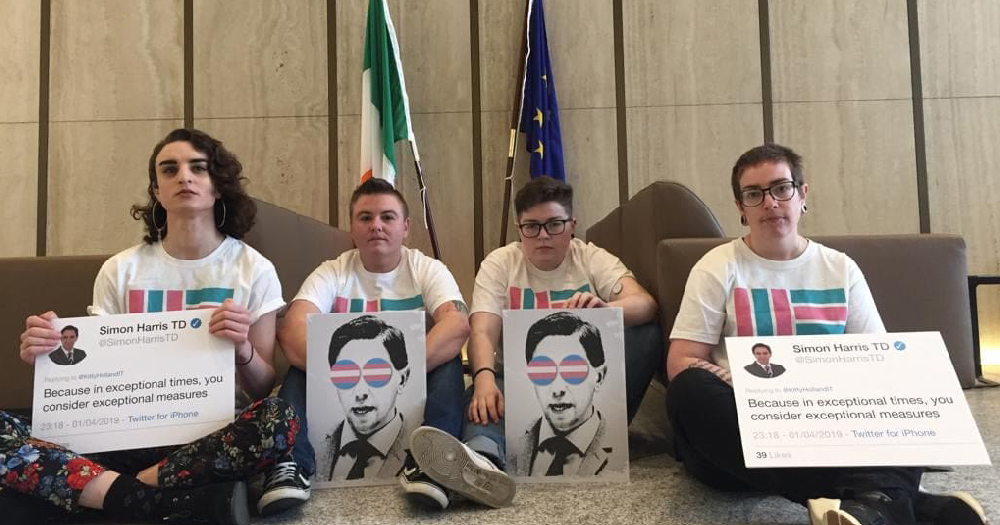This Is Me, a national grassroots campaign advocating for safe, accessible, best practice standards for care to be provided to transgender people in Ireland, are today staging a sit-in at the Department of Health building on Baggot Street. This is in demand of the meeting that Minister for Health, Simon Harris TD has promised the campaigners on multiple occasions over the past 13 months.
https://www.facebook.com/ThisIsMeIreland/videos/2276459979287235/
Speaking at the sit-in, Noah Halpin, founder of This Is Me said “We have played political niceties for well over a year now, but there comes a time when patience wears thin. Simon Harris has agreed to meet with us on multiple occasions, through multiple channels and he has not yet followed through on this commitment. Trans-specific healthcare in Ireland is at a crisis point. And this is being largely ignored. People are dying because of this. We have viable solutions. ”
The campaigners have stated that they will continue their sit-in at the Department of Health until they receive a confirmed time, date and location of the promised meeting with Minister Harris to discuss the introduction of official provisions for transgender healthcare in line with WPATH standards of care, and will not voluntarily leave the building until this official arrangement has been made.
Minister for Health, Simon Harris TD has committed to meeting with the This Is Me – Transgender Healthcare Campaign numerous times:
- Publicly through An Taoiseach Leo Varadkar during Leaders Questions in the Dail, July 2018.
- Minister Harris also committed publicly on Twitter to follow up on this meeting in November 2018.
- Following the campaign’s last public demonstration, July 2018, Minister Harris is also quoted in saying that he will meet with the campaign.
- Privately through conversation, by the request of a number of TD’s and Senators since March 2018.
However, this meeting has not yet come to fruition and the Minister has not yet made contact with the campaign, despite This Is Me’s numerous attempts to communicate and proceed with the promised meeting. This meeting is sought to discuss transgender healthcare in Ireland, highlight the crisis that this area of healthcare is currently under and discuss viable solutions with those directly affected, with lived experienced and extensive knowledge in the area.
One year ago, the @WHO (World Health Organization) DECLASSIFIED Trans Identities as mental health or behavioral disorders.
Meaning they absolutely shouldn’t be treated as such.
In Ireland,we’re still treating trans people as psychiatric disorders needing diagnosis #WorldHealthDay pic.twitter.com/hiDH8jZtpi— ThisIsMe Campaign (@ThisIsMeIreland) April 7, 2019
Despite the World Health Organisation (WHO) declassifying transgender identities as mental health or behavioural disorders 12 months ago, Ireland are still practising a strict psychiatric diagnostic model. Forcing transgender people to obtain a psychiatric diagnosis prior to being recommended for HRT (Hormone replacement therapy). This model of care is damaging, outdated and not in accordance with international best practice standards of care, which advises an informed consent model of care in line with WPATH (World Professional Association of Transgender Health).
There are only 3 endocrinologists providing HRT to Trans people in Ireland. Based in Galway, Dublin and Louth. This is despite the fact that GP’s provide HRT to cisgender people on a daily basis. This treatment is not restricted and GP’s are fully capable of providing it to all patients in need, regardless of gender identity. In order to be referred to one of the three endocrinologists, a person must first obtain a psychiatric diagnosis (two in some cases) of ‘gender dysphoria’.
WPATH is intl best practice standards of care for trans healthcare.
They recommend an informed consent model.
In Ireland, we use a dangerous, outdated psychiatric model.
Of which is causing waiting lists of almost 3 years and huge distress.#WorldHealthDay2019 #WorldHealthDay pic.twitter.com/rYNT8g1y9S— ThisIsMe Campaign (@ThisIsMeIreland) April 7, 2019
There are only a limited number of psychiatrists providing this diagnosis, meaning that waiting lists have now soared to 28-33 months on average. There has also been an increase in Trans people being refused treatment based on a psychiatric evaluation of their outward appearance, relationships, familial support and progression of social transition.
These people are then not being provided with any mental health supports following the refusal of treatment. In Ireland, there are currently no surgeons who provide gender affirmation surgery, forcing Trans people abroad for major, invasive and personal procedures, with little to no aftercare once they return home.
In a report by the Irish Commission for Human Rights and Equality, dated April 2017, it was stated that transgender healthcare in Ireland is in violation of the European Social Charter and that trans healthcare in Ireland has “inadequate provision of services and that treatment is not guaranteed in practice.”
© 2019 GCN (Gay Community News). All rights reserved.
Support GCN
GCN is a free, vital resource for Ireland’s LGBTQ+ community since 1988.
GCN is a trading name of National LGBT Federation CLG, a registered charity - Charity Number: 20034580.
GCN relies on the generous support of the community and allies to sustain the crucial work that we do. Producing GCN is costly, and, in an industry which has been hugely impacted by rising costs, we need your support to help sustain and grow this vital resource.
Supporting GCN for as little as €1.99 per month will help us continue our work as Ireland’s free, independent LGBTQ+ media.
